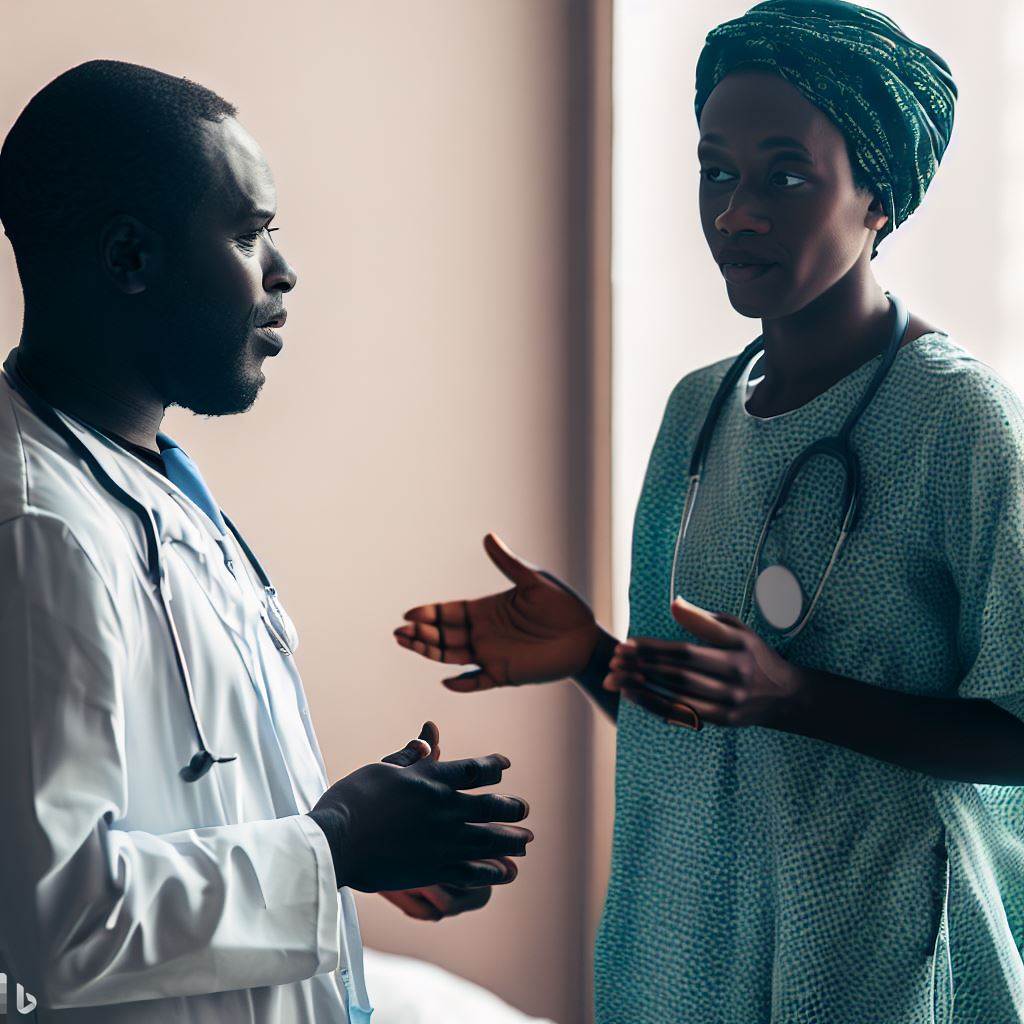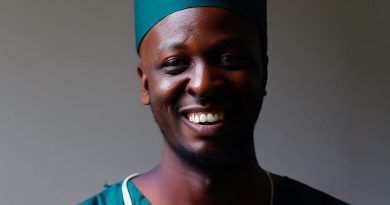The Doctor-Patient Relationship: A Nigerian Context
Last Updated on January 27, 2024
Introduction
The doctor-patient relationship is a vital bond between healthcare providers and patients.
Understanding this dynamic in the Nigerian context holds immense significance.
Importance of Studying the Doctor-Patient Relationship in a Nigerian Context
- Cultural Factors: Nigeria’s diverse culture influences medical beliefs and practices.
- Communication: Effective doctor-patient communication enhances treatment outcomes.
- Trust Building: Establishing trust fosters patient compliance and satisfaction.
- Healthcare Access: Improving relationships can bridge gaps in healthcare access.
- Health Equity: Addressing disparities can lead to more equitable medical care.
- Patient Empowerment: Informed patients actively participate in healthcare decisions.
- Legal Implications: Knowing patient rights and medical ethics safeguards both parties.
- Health Policy: Insights can shape policies to better serve the Nigerian population.
Understanding the doctor-patient relationship in Nigeria benefits individuals and the entire healthcare system.
Historical Context of the Doctor-Patient Relationship in Nigeria
Evolution and traditional beliefs regarding healthcare practices
Traditional Nigerian healthcare practices were largely based on spiritual beliefs and the use of herbal remedies.
Shamans and herbalists played a significant role in diagnosing and treating illnesses in local communities.
Patients often sought the guidance and treatment of traditional healers, attributing illnesses to spiritual causes.
The doctor-patient relationship in Nigeria was influenced by the belief in supernatural powers and ancestral spirits.
Influence of colonialism on healthcare systems and patient care
With the arrival of colonial powers in Nigeria, Western medicine and practices were introduced.
Colonial authorities aimed to establish a healthcare system based on European medical principles.
Traditional healers and their practices were marginalized, leading to a shift in the doctor-patient relationship.
Western medicine became the dominant form of healthcare, altering the perception of caregivers in society.
Shaping the doctor-patient relationship dynamics
The adoption of Western medicine created a power dynamic between doctors and patients. Doctors were regarded as authority figures, possessing knowledge and expertise above the patient.
Patients became passive recipients of care, often lacking autonomy in decision-making. This hierarchical relationship continues to influence the doctor-patient dynamic in Nigeria today.
The doctor-patient relationship in Nigeria is further complicated by issues of trust and communication. Historical experiences of exploitation and mistreatment by colonial powers have created distrust in Western medicine.
Patients may be hesitant to disclose sensitive information or question the doctor’s decisions due to power differentials. Cultural beliefs and language barriers can also hinder effective communication between doctors and patients.
Efforts have been made to improve the doctor-patient relationship in Nigeria. Medical schools now emphasize the importance of patient-centered care and communication skills.
Patient education programs aim to empower individuals to actively participate in their healthcare decisions. Collaborative initiatives between healthcare professionals and traditional healers have been established to bridge the gap between traditional and modern medicine.
The doctor-patient relationship in Nigeria is gradually evolving towards a more egalitarian dynamic. Patients are increasingly demanding transparency, shared decision-making, and respect for their autonomy.
Doctors are recognizing the importance of cultural sensitivity and effective communication in providing quality care. However, challenges remain in transforming the doctor-patient relationship in Nigeria.
Limited resources and access to healthcare services continue to hinder equal and patient-centered care. Addressing these systemic issues will be crucial in creating a more equitable healthcare system.
In summary, the historical context of the doctor-patient relationship in Nigeria has been shaped by traditional beliefs, colonial influences, and power differentials.
Efforts are being made to improve communication, trust, and patient-centered care, but systemic challenges still need to be addressed.
Read: Trends Shaping Nigeria’s Transportation Industry Careers
Current Challenges in Establishing Strong Doctor-Patient Relationships in Nigeria
In the Nigerian context, several challenges hinder the establishment of strong doctor-patient relationships:
Limited access to healthcare services for the majority of the population
Nigeria’s healthcare system faces numerous challenges, including inadequate infrastructure and a shortage of healthcare professionals. These issues result in limited access to healthcare services for a significant portion of the population.
Remote rural areas are particularly affected, where healthcare facilities are scarce or non-existent. The lack of access prevents patients from establishing ongoing relationships with doctors, undermining the development of trust and comprehensive care.
Read: Challenges and Solutions in Nigeria’s Social Work Practice
Sociocultural factors affecting patient expectations and behavior
Nigeria’s cultural diversity influences patient expectations and behavior towards physicians. Different ethnic groups and their traditional beliefs may impact how patients perceive and interact with healthcare providers.
For instance, some patients may favor traditional medicine over modern medicine, causing conflicts in the doctor-patient relationship. Additionally, cultural norms may hinder patients from openly discussing their health concerns or seeking preventative care, further complicating the establishment of strong doctor-patient relationships.
Communication barriers between doctors and patients
Effective communication is essential for building a strong doctor-patient relationship. However, in Nigeria, communication barriers pose significant challenges.
Limited health literacy levels make it difficult for patients to understand medical information, leading to confusion and potential non-compliance with treatment plans. Furthermore, language barriers exist, as Nigeria is home to multiple indigenous languages.
Doctors who do not speak the patient’s primary language may struggle to articulate medical advice clearly, hindering patient understanding and trust.
Financial constraints and its impact on healthcare quality
Financial constraints play a crucial role in shaping the doctor-patient relationship in Nigeria. High poverty rates and limited financial resources make it difficult for many Nigerians to afford quality healthcare.
This financial burden affects patients’ ability to access necessary medical services, including regular check-ups and follow-up appointments. In turn, doctors may face time constraints, inadequate resources, and pressure to prioritize patients who can afford to pay, compromising the overall quality of healthcare provided.
In essence, establishing strong doctor-patient relationships in Nigeria is faced with several challenges. Limited access to healthcare services, sociocultural factors, communication barriers, and financial constraints all contribute to the complexity of this relationship.
Addressing these challenges requires improvements in healthcare infrastructure, cultural sensitivity and awareness, enhanced communication skills among healthcare professionals, and making healthcare more affordable and accessible to all Nigerians.
Read: Spotlight: Nigerian Innovators in Mechanical Engineering

The Role of Culture and Religion in the Doctor-Patient Relationship
Traditional beliefs and their influence on patient attitudes towards medical treatment
Many Nigerians hold strong traditional beliefs that impact their views on healthcare. These beliefs often shape patients’ attitudes towards seeking and accepting medical treatment.
Traditional practices such as herbal remedies and spiritual healing are still widely valued. Patients may prioritize traditional methods over Western medicine due to cultural influences.
Understandably, these attitudes can sometimes create challenges between doctors and patients. Doctors must be sensitive to patients’ beliefs and work towards building trust and understanding.
Read: Step-by-step Guide to Becoming a Nursing Assistant in Nigeria
The impact of religious practices on healthcare decision-making
Religion plays a significant role in the lives of many Nigerians. Religious beliefs and practices often influence healthcare decision-making.
Patients may rely on prayer and faith-based healing rather than solely relying on medical interventions. Doctors should be aware of the influence of religion and consider it when providing care.
Effective communication is necessary to address patients’ religious concerns and provide appropriate care. Collaborating with religious leaders and incorporating spiritual support can improve doctor-patient relationships.
Culturally competent approaches to enhance doctor-patient relationships in Nigeria
- Culturally competent healthcare respects and incorporates patients’ cultural and religious values.
- Doctors need to be knowledgeable about the cultural practices and beliefs prevalent in Nigeria.
- Building cultural competence requires ongoing education and awareness for healthcare professionals.
- Sensitivity to diverse customs, traditions, and beliefs fosters better doctor-patient relationships.
- Recognizing cultural differences can assist doctors in tailoring treatment plans to patients’ needs.
- Developing trust and mutual respect leads to improved healthcare outcomes and patient satisfaction.
In the end, culture and religion play crucial roles in the doctor-patient relationship in Nigeria.
Traditional beliefs and religious practices heavily influence patients’ attitudes towards medical treatment.
Doctors must understand and respect these beliefs in order to provide effective and culturally competent care.
By considering patients’ cultural and religious values, doctors can enhance their relationships with patients and ultimately improve healthcare outcomes.
Read: Working on Luxury Yachts: The Nigerian Perspective
Learn More: Phlebotomist’s Career Outlook in Nigeria for 2023-2028
Improving the Doctor-Patient Relationship in Nigeria
Enhancing communication and empathy skills of healthcare professionals
- Develop training programs to improve communication and empathy skills of healthcare professionals.
- Encourage doctors to actively listen to patients and understand their concerns and needs.
- Ensure healthcare professionals are sensitive and empathetic towards cultural and religious beliefs of patients.
- Promote effective two-way communication that fosters trust and understanding between doctors and patients.
Strengthening patient education and empowerment
- Enhance patient education programs to improve health literacy and enable patients to make informed decisions.
- Provide patients with accessible information about their medical conditions, treatments, and potential outcomes.
- Encourage patients to actively participate in their healthcare decisions and be involved in goal-setting.
- Empower patients to ask questions, seek second opinions, and voice their concerns during consultations.
Read: The Role of Exercise Physiology in Nigeria’s Sports Industry
Increasing accessibility and affordability of healthcare services
- Improve healthcare infrastructure by increasing the number of medical facilities and personnel.
- Develop strategies to reduce waiting times and improve the efficiency of healthcare services.
- Implement policies to make healthcare services more affordable and accessible to all socioeconomic groups.
- Expand health insurance coverage to ensure financial protection for patients and reduce out-of-pocket expenses.
Implementing patient-centered care models
- Promote the adoption of patient-centered care models that prioritize individual patients’ needs and preferences.
- Encourage doctors to collaborate with patients in developing personalized treatment plans.
- Foster a culture of shared decision-making and mutual respect between doctors and patients.
- Regularly assess patient satisfaction to identify areas for improvement and address any concerns or issues.
In review, improving the doctor-patient relationship in Nigeria requires a multi-faceted approach.
Enhancing communication and empathy skills of healthcare professionals, strengthening patient education and empowerment, increasing accessibility and affordability of healthcare services, and implementing patient-centered care models are key steps towards building a stronger doctor-patient relationship.
By prioritizing these strategies, Nigeria can strive towards a healthcare system that promotes better patient outcomes and satisfaction.
Read: Career Progression for Mechanical Engineers in Nigeria
Learn More: A Comprehensive Guide to Becoming a Home Health Aide in Nigeria
Conclusion
Throughout this blog, we have explored the doctor-patient relationship in a Nigerian context. We have highlighted the importance of trust, effective communication, and mutual respect in nurturing a strong bond between doctors and patients.
Firstly, trust is the foundation of any successful doctor-patient relationship. Patients need to trust their doctors to provide accurate diagnoses and appropriate treatment, while doctors must trust their patients to provide honest information about their health.
Secondly, effective communication is vital for understanding and addressing patients’ concerns. Doctors must clearly and compassionately explain medical information, treatment plans, and potential side effects.
Patients should feel comfortable asking questions and expressing their fears or doubts.
Lastly, mutual respect is essential for collaboration. Both doctors and patients should value each other’s perspectives and expertise.
Doctors should consider patients’ cultural beliefs and experiences when making decisions, while patients should respect doctors’ medical knowledge and recommendations.
Nurturing strong doctor-patient relationships is crucial for improving healthcare outcomes in Nigeria. When patients trust their doctors and have open communication, they are more likely to adhere to treatment plans and follow medical advice.
This can lead to better health outcomes, reduced hospital readmissions, and improved overall patient satisfaction.
Additionally, strong doctor-patient relationships contribute to a more efficient healthcare system. Doctors who understand their patients’ needs and values can tailor treatments accordingly, minimizing unnecessary procedures and reducing healthcare costs.
Ultimately, investing in building and maintaining these relationships will lead to a healthier population and a stronger healthcare system in Nigeria.
On a final note, the doctor-patient relationship plays a pivotal role in healthcare delivery in Nigeria.
By emphasizing trust, effective communication, and mutual respect, healthcare professionals can foster strong relationships with their patients, resulting in better healthcare outcomes for the Nigerian population as a whole.


